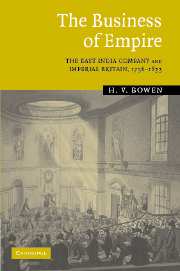Book contents
- Frontmatter
- Contents
- List of figures
- List of tables
- Preface
- Notes on the text
- List of abbreviations and short titles
- 1 Introduction
- 2 Relationships: city, state, and empire
- 3 Relationships: government and the Company
- 4 People: investors in empire
- 5 People: Company men
- 6 Methods: an empire in writing
- 7 Methods: the government of empire
- 8 Methods: the management of trade
- 9 Influences: the Company and the British economy
- Afterword
- Index
Afterword
Published online by Cambridge University Press: 09 July 2009
- Frontmatter
- Contents
- List of figures
- List of tables
- Preface
- Notes on the text
- List of abbreviations and short titles
- 1 Introduction
- 2 Relationships: city, state, and empire
- 3 Relationships: government and the Company
- 4 People: investors in empire
- 5 People: Company men
- 6 Methods: an empire in writing
- 7 Methods: the government of empire
- 8 Methods: the management of trade
- 9 Influences: the Company and the British economy
- Afterword
- Index
Summary
The East India Company Charter Bill of 1833 prompted very little debate or controversy in Parliament or the Company. In part this was because the political nation had been preoccupied with the Reform Act of 1832; in part it was because people had tired of East Indian affairs; and in part it was because the Company had long been set on course to lose its remaining commercial privileges. Indeed, many within the Company regarded the loss of the China monopoly as inevitable, and between 1830 and 1833 the stockholders preoccupied themselves with ensuring that they would continue to receive an annual dividend of 10½ per cent charged on the Indian revenues. Unlike in 1792–3 or 1812–13, there was little discussion of the profitability of the Company's trade or the contribution made by the Company to the well-being of Britain's economy or state finances, and there was widespread agreement that the Company's commercial days were over. As Thomas Babington Macaulay, the Secretary of the Board of Control who framed the settlement of 1833 with the Company, said of the opening of the trade with China, ‘On that subject all public men of all public parties seem agreed.’ He was correct and, when the Company's stockholders learned that their future dividends were to be guaranteed, they meekly accepted the settlement agreed between the directors and government.
- Type
- Chapter
- Information
- The Business of EmpireThe East India Company and Imperial Britain, 1756–1833, pp. 296 - 298Publisher: Cambridge University PressPrint publication year: 2005

